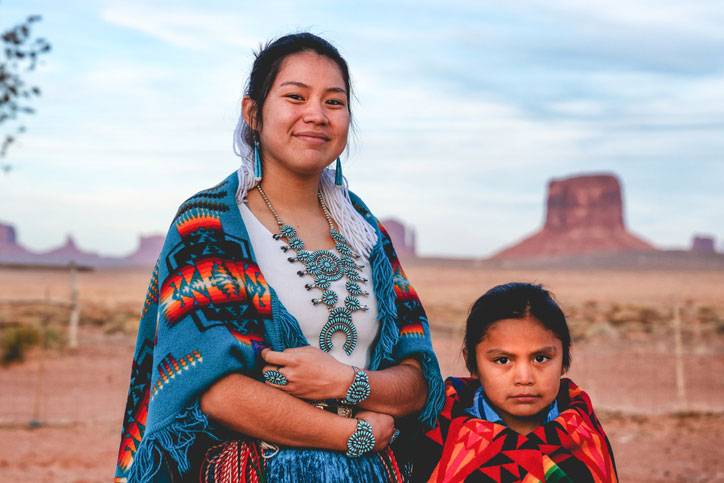

Humanity has spawned innumerable traditions and cultures across its history. Many would say these creative and collaborative elements of the human experience are the most fascinating aspect of our existence. Focusing in on just one corner of the globe reveals a rich mix of religions, social norms and customs, physiological adaptations, and familial structures.
Anthropologists study the socio-cultural and biological aspects of humanity. They investigate the differences and commonalities between groups of people living across the globe, from the cities of Southeast Asia to the South American forests; the Ural Mountains to the African plains.
As a scientific and sociologic exploration of humanity, anthropology is an exciting field of study that finds a very natural home in any liberal arts degree program. It is a career steeped in the most fascinating type of enquiry, giving us a chance to look at ourselves and what makes us human.
Anthropologist Job Description
Anthropologists study the cultures, languages, physical characteristics, and social systems of human beings. This involves:
- Conducting interviews with a community’s leaders.
- Analyzing DNA samples from a specific group of people.
- Conducting market research for a corporation exploring a new territory.
Those day-to-day tasks just scratch the surface of what you could do as an anthropologist. Generally speaking, there are five types of anthropologists: cultural anthropologists, biological anthropologists, linguistic anthropologists, forensic anthropologists, and corporate anthropologists. There are a lot of different jobs anthropologists can do.
Cultural Anthropologist Job Description
As the name suggests, cultural anthropologists study the beliefs, practices, and social structures of a people. For example, a cultural anthropologist may study the hierarchical structure of southwestern Afghanistan Pashtun tribes. It is an endeavor which seeks to understand why and how a group of people organize themselves and the physical world around them.
So, what does a cultural anthropologist do on a daily basis?
Participant observation: Cultural anthropologists use this research method as a means to truly understand a culture. They either live as an integral member of that group or observe from the sidelines. The qualitative data and field notes that be collected involve everything from behavioral observations to transcripts of conversations among group leaders to pictures of cultural symbols or icons, among other things.
In-Depth Individual Interviews: Cultural anthropologists often conduct in-depth individual interviews with “informants.” An informant could be anybody from a community leader to a tradesperson.
Biological Anthropologist Job Description
Biological anthropologists study how humans have evolved over time. They analyze how we, as a species, have adapted to the world’s habitats, as well as the biosocial variations that exists across different cultures. Here are some of the questions biological anthropologists may seek to answer:
- How have the Inuit people adapted to the cold via behavior and their biology?
- Why do two groups sharing a common ancestry display differences in height and weight?
- What physical adaptations do mountain-dwelling humans possess which low-land or urban-dwelling humans do not? Have they changed over time?
Finding the answers often requires not only in-field observations but also analyzing lab work. So, there’s some facets of even cultural anthropology that align with the biological specialty. Here are some of examples of what biological anthropologists do on a daily basis:
- Taking anthropometric measurements of the individuals within a group to understand how they develop. Anthropometry is the study of measurements and proportions of the human body.
- Collecting hair, saliva, or other such samples for later analysis. These samples help anthropologists understand a population’s genetics, dental anthropology, and biochemical genetics, among other characteristics.
- Developing rapport with populations under study by participating in their culture.
Biological anthropology isn’t just about the hard sciences. It’s the study of human beings, after all. So, the soft skills you’ll develop in your liberal arts program will come in handy. Before collecting DNA samples, you need to use your emotional intelligence to establish trust with the communities you’re studying.
The Work of Biological Anthropologist Nina Jablonski
 Nina Jablonski had a couple of questions: Why is darker skin more common in areas with high ultraviolet contexts? Why do people in areas with low UV contexts typically have lighter skin?
Nina Jablonski had a couple of questions: Why is darker skin more common in areas with high ultraviolet contexts? Why do people in areas with low UV contexts typically have lighter skin?
She found the answers in the biochemistry of our bodies. UV radiation breaks down folic acid, a key vitamin needed to produce our cells and DNA. Dark skin pigmentation helps block UV, protecting the folic acid reserves of people living in areas like Central Africa.
However, if the body doesn’t absorb enough UV radiation, it won’t be able to absorb vitamin D from the sun – a key ingredient for a strong skeleton. So, people in areas with low UV exposure in northern European countries developed light skin so that they could absorb that radiation. Jablonski’s findings are a classic example of biological anthropological work.
Linguistic Anthropologist Job Description
Linguistic anthropologists study the utility behind language: How do people use it in their daily lives? How have languages changed over time? Why have they changed? How do languages affect behavior?
The aim of linguistic anthropology is to understand how cultures use language to exchange information. If two separate cultures, using two distinct alphabets, were tasked with teaching their children how to build houses, how would each culture use language to instruct them? Would that affect how the children built the houses?
Much like their peers, linguistic anthropologists work all over the world. Most work for universities, researching the languages of people across the globe, conducting:
- Participant observation to see how individuals within a culture use their language to solve problems, complete projects, express concerns, and tell stories.
- Individual interviews to pick up slang, idioms, and other characteristics of a people’s language.
These and other methods help linguistic anthropologists answer whatever questions they’re investigating as a part of their research.
Forensic Anthropologist Job Description
 Are you compelled to help law enforcement solve cases? Forensic anthropologists assist state and federal agencies in retrieving and analyzing unidentified human remains. There’s a lot of archaeology and biological science involved with the work itself.
Are you compelled to help law enforcement solve cases? Forensic anthropologists assist state and federal agencies in retrieving and analyzing unidentified human remains. There’s a lot of archaeology and biological science involved with the work itself.
Picture this: a construction crew is digging the foundation for a gas station. A worker discovers what looks to be a bone. He turns his shovel on it, and realizes it’s a ribcage.
So begins the investigation. A forensic anthropologist is hired to analyze the remains while they’re still at the scene and sets out to answer several questions:
- What was the victim’s lifestyle? Did they work with their body or have an office job?
- How did the victim die?
- What was the victim’s sex?
- Approximately how old was the victim at the time of death?
Later on, the forensic anthropologist helps transfer the remains to a lab for further analysis.
Forensic anthropologists apply similar techniques to archaeologists and biological anthropologists. However, their primary objective is to assist law enforcement with solving crimes. That’s the crux of their roles.
Corporate Anthropologist Job Description
Corporate anthropologists (also known as “business anthropologists”) systematically observe a business’s employees and customers. They want to identify what gives workers purpose, how customers use products, employee culture, and dozens of other factors.
For example, suppose you interview for a corporate anthropologist position at a nationwide software company. That organization would want to know:
- How customers are using their technology in conventional and unexpected ways.
- If there’s any naturally occurring “pecking order” within the company: how do employees naturally choose leaders?
- If employees find meaning in their work. How do they find it?
- How the company’s culture respond to “thought leadership” coming from the industry. Do workers ignore or engage with it? Why or why not?
Corporate anthropologists implement the same techniques as cultural anthropologists: in-depth interviews and participant observation are par for the course.
You may think corporate anthropology is a new field, but it’s actually been around for quite some time. Big names such as Nokia, Intel, Microsoft and Xerox have hired corporate anthropologists to help build stronger cultures and businesses.
How to Become an Anthropologist: Meeting the General Education and Degree Requirements to Become an Anthropologist
A degree in liberal arts will set a fine foundation for a career as an anthropologist. Sociology, psychology, political science and even literature are applicable to the field; each explores a facet of humanity.
During your undergrad years, enroll in courses that explore anthropological theory and concepts. Don’t be afraid to go beyond “Anthropology I & II” courses, either. See if your university offers class that cover:
- Cultural anthropology
- Human evolution
- Archaeology
- Linguistic anthropology
- Ethnographic research methods
- Religion and culture
- Bioethics and culture
These courses will allow you to get a general feel for what you want to specialize in. Do you want to study how we’ve evolved over the past four centuries? Or dissect the linguistic differences between two cultures with genealogical similarities?
Such questions can help you determine what you want to get your master’s degree in. Most anthropology jobs demand at least a master’s degree, and advanced positions require PhDs. All in all, the process could take anywhere from two to six years, depending on what you’re pursuing.
Liberal arts will cover many of the “soft skills” anthropologists need: strong communication and emotional intelligence being two. But what “hard skills” do you need?
Anthropology Hard Skills: Statistics and Archeology
 Statistics – Shirley J. Fiske, a research professor with the University of Maryland’s Department of Anthropology, provides some useful insight into what discrete skills aspiring anthropologists should possess.
Statistics – Shirley J. Fiske, a research professor with the University of Maryland’s Department of Anthropology, provides some useful insight into what discrete skills aspiring anthropologists should possess.
Back in 2008, she interviewed anthropologists working for the federal government. She asked them what advice they’d give to those considering a path in the public sector. The interviewees said that, in addition to having a graduate degree, federal agencies sought students with training in statistics and methodology. Of course, math is a core part any job that involves data-driven research, and that includes anthropology.
For example, the University of Washington’s Center for Statistics and the Social Sciences offers statistics-focused courses. They’re designed specifically for anthropology PhD candidates:
- Structural Equation Models for Social Sciences
- Sample Survey Techniques
- Analysis of Categorical and Count Data
- Bayesian Statistics for the Social Sciences
- Causal Modeling
- Multivariate Data Analysis for the Social Sciences
What if you don’t plan on working for the federal government? Do you still need to know statistics? The skill will help you out in your career. Especially if you intend to publish peer-reviewed research.
Don’t be intimidated if you’re not familiar with statistics. Start from the ground up. Most universities recommend a strong understanding of algebra before taking an introductory statistics course. Enroll in some algebra courses during your undergrad.
Archeology – Archaeology and anthropology go hand-in-hand in many ways. Instead of excavating the tombs of ancient empires, anthropologists use archaeological techniques to study human remains. Through these investigations, they can answer a variety of questions:
- What did they eat? Did they suffer from nutritional deficiencies?
- How old were they at the time of death?
- What was the cause of death?
- Were they buried with any culturally significant artifacts?
There’s more to archaeology than just chiseling away at old rocks. It’s an essential skill, especially for biological and forensic anthropologists. With that in mind, you should pursue courses such as:
- Introduction to Archaeology
- Archaeological Science
- Archaeological Field Methods
This hard skill may not be a requisite for some specialties. Corporate and linguistic anthropologists may find marginal use for archaeology. Those specialists will focus more on gathering qualitative data than analyzing remains.
Speaking of specialties, what do you need to learn to become a cultural anthropologist? What about a biological anthropologist? Let’s discuss the educational requirements of each concentration in depth.
Education Requirements to Become a Cultural Anthropologist
An undergraduate degree in anthropology is preferable if you want to get into cultural anthropology. Doing so will help you get a job as an assistant or field worker over those who don’t have this degree. It’s not impossible with a liberal arts degree, but your coursework in anthropological courses should shine. A few letters of recommendations from your professors can go a long way as well.
Working in the field will also make it easier for you to get accepted into a master’s program. Master’s degrees in cultural anthropology usually take two years to complete. Most include field work as part of the curriculum, and will set you up with almost any job in the concentration. The following schools offer master’s degrees with concentrations in cultural anthropology:
A number of universities also offer PhDs in cultural anthropology. Across the board, they recommend those with bachelor’s degrees in other fields take additional anthropology coursework to meet their PhD requirements. PhD requirements generally include:
- Creating a dissertation proposal to present to a committee of program leads.
- An acceptance exam which assesses your ability to understand the work as a whole.
- Five to six semesters of course work.
- Applying for fieldwork grants.
All things considered, acquiring a PhD in cultural anthropology could take between three and four years to complete, including the fieldwork. Each university is different, so you’ll need to research which programs seem like the best fit for you.
Education Requirements to Become a Biological Anthropologist
After completing your bachelor’s in liberal arts, pursue at least a master’s in biological anthropology. Many biological anthropologists work in academia or research. Therefore, getting your master’s and eventually a PhD in the field is a standard requirement for a professorship in research with a college or university, and even research assistants are typically graduate students or doctoral candidates.
The American Association of Biological Anthropologists recognizes dozens of schools that offer master’s degrees in biological anthropology.
Don’t shed the humanities-intensive courses from your undergraduate studies: every anthropologist needs them. The soft skills you’ll acquire through your liberal arts degree will be indispensable, even in a technical field. You can’t expect to collect hair from someone if you haven’t developed rapport with them.
That being said, there are a few core biology-focused courses you should take while pursuing your undergrad. Look for courses that touch on the following:
- Anatomy and physiology
- Basic and advanced biology
- Human genetics, evolution, and adaptation
- Nutrition
Education Requirements for Becoming a Forensic Anthropologist
You need a master’s degree or a doctorate to become a forensic anthropologist. A graduate-level education is so fundamental to working in the field that it has become the American Board of Forensic Anthropology’s recommended standard. The board recommends a degree that focuses on biological, physical, or forensic anthropology. The process usually takes between six and 10 years to complete.
You may think forensic anthropology is “too technical” a field for someone with a liberal arts degree. That’s not necessarily the case. Courses on literature, sociology, psychology and other liberal arts courses help students understand what it means to be human on an individual and cultural basis. That’s the foundation of anthropology.
This foundation can be the springboard for a master’s degree in forensic anthropology. The courses you’ll take as a part of that program will likely include:
- Human Anatomy and Osteology
- Forensic Anthropology Techniques
- Taphonomy (the branch of paleontology that studies fossilization)
- Forensic Trauma Analysis
- Applied Forensic Anthropology
- Crime Scene Awareness
Dozens of schools across the country offer master’s degrees in forensic anthropology or concentrations in the field.
While pursuing your bachelor’s, supplement your coursework with classes that touch on archaeology and biology. Courses in anatomy and osteology, will serve you well. If you have the opportunity to take classes in forensic anthropology as an undergrad, don’t hesitate.
Education Requirements to Become a Linguistic Anthropologist
Naturally, linguistic anthropologists need active listening, speaking and reading comprehension skills. But it’s also a role that requires complex problem-solving skills and social awareness, precisely the skills a liberal arts education is designed to teach.
The liberal arts compel students to engage in discourse. Through that discourse, students pick up the communication and social skills every linguistic anthropologist needs. To stand out among your peers, you can supplement your liberal arts background with language-focused courses. Here are some examples:
- The Structure of Modern Chinese
- Semantics
- Language in Society
- General Linguistics
Such courses will set you up to get your master’s. As many linguistic anthropologists work in an academic capacity, most positions require a master’s degree in the field. How long it takes to complete varies from school to school, but most are a minimum two-year commitment that includes:
- Core courses: Typically four or more classes pertaining to linguistic anthropology. Language structure, linguistic theory, field research methodologies, and language data analysis.
- A master’s thesis: Usually contains original and secondary research, a review of the literature applicable to your thesis, and a position paper.
Education Requirements for Becoming a Corporate Anthropologist
Corporate anthropology and cultural anthropology are two sides of the same coin. Corporate anthropologists also conduct in-field research – in-depth interviews, participant observation, and other techniques.
As such, your academic career will look similar to that of a cultural anthropologist’s. A bachelor’s degree will get your foot in the door, but many companies hiring anthropologists are looking for candidates with advanced degrees.
Throughout your undergraduate program, enroll in courses that explore business culture and practices. Remember: corporate anthropologists enlighten business leaders as to why their employees and customers behave. Taking business courses such as the ones below will help you speak the same language:
- Business management and administration
- Marketing
- Business ethics
- Professional communications
These are pretty general examples. If you find a business-related course that dives into something more specific, take it. Whatever inspires you. It could be digital marketing, brand management, or sales techniques.
In addition, pursue an internship at a business that excites you, even if it’s not directly related to anthropology. It could be a position in marketing, sales, product development – the sky’s the limit.
At the end of your undergrad, pursue a master’s degree in either cultural anthropology, business management, or corporate anthropology.
Anthropologist Salary
As of May 2020, the median annual salary for anthropologists and archeologists was $66,130, according to the Bureau of Labor Statistics (BLS). While those at the bottom 10 percent made less than $40,800 per year, the top 10 percent earn six figures: at least $102,770 per year. That’s why many pursue a PhD in the field: it pays off in the long run.
Keep in mind that, like other careers, the median annual wage for anthropologists fluctuates depending on who you work for. Take a look:
- Federal government: $79,270 per year.
- Engineering services: $71,450 per year.
- Management, scientific, and technical consulting services: $62,680 per year.
- R&D in the social sciences and humanities: $59,240 per year.
What about engineering services? Anthropologists seek to determine how building a bridge or a new housing development may impact a community. Or they may analyze human behavior to determine how machines may increase productivity or leisure time. Western Kentucky University cited other examples:
- Assigning military personnel to tasks or jobs relevant to materiel.
- Designing products to minimize waste.
- Optimizing worker safety or comfort.
Forensic Anthropologist Salary
The BLS reports that 19 percent of anthropologists work for federal agencies. According to research from Shirley J. Fiske, these anthropologists help agencies manage a variety of projects. Some departments may want to analyze the impact of public programs on different populations. Others, like the FBI, may hire forensic anthropologists to help solve crimes.
The average forensic anthropologist salary in 2020 was $82,040, as shown in the BLS industry classification for anthropologists who work for the federal executive branch.
Where Do Anthropologists Make the Most?
Anthropologists work all over the world. However, we can get a good idea of what those based in the U.S. are making. Below are the states that pay the highest average annual salaries:
- New York: $92,710
- Alaska: $88,340
- Hawaii: $85,560
- Illinois: $76,960
- Idaho: $76,260
- Washington: $74,830
- California: $74,680
- Pennsylvania: $74,580
- Minnesota: $74,440
- Louisiana: $72,850
It’s no surprise New York is at the top of the list, given the number of universities in the state and the cost of living. Experienced anthropologists in the state make an excellent living: the top 10 percent of earners bring in $157,940 or more per year.
As you can see, New York isn’t the only state that offers anthropologists a good living. Alaska’s best and brightest break the six-figure mark as well. The top 10 percent of anthropologists in this state gross at least $111,550 annually.
Can’t stand the cold? Hawaii’s not a bad place for anthropologists, either. Gain experience and a PhD in an in-demand specialty, and you could end up making at least $120,800 a year. That’s a great living, even in a state as expensive as Hawaii.
What Does the Job Market Look Like for Anthropologists?
The BLS projects jobs for anthropologists and archeologists to grow 7 percent between 2020 and 2030. That’s about as much as the average for all occupations. The BLS based its projects on the number of people expected to retire or transfer out of the field on a yearly basis – around 800 annually.
If the field ignites your passion, pursue it. The money will come. It will take hard work and commitment, but stick it out, and becoming an anthropologist will pay off.
2020 US Bureau of Labor Statistics salary figures and job market trends for Anthropologists and Archeologists are based on national data, not school-specific information. Conditions in your area may vary. Data accessed December 2021.






